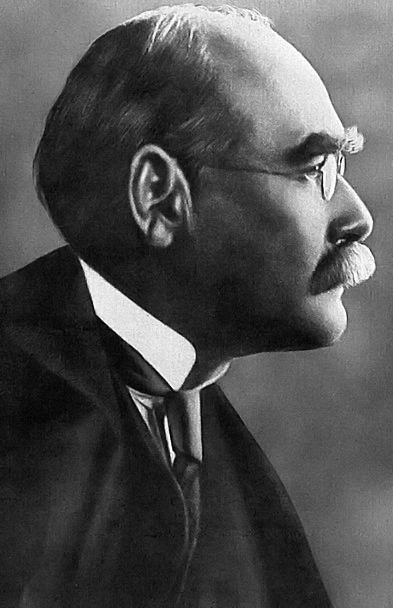
Public domain photograph of Rudyard Kipling
Rudyard Kipling (1865-1936)
Far-called, our navies melt away;
On dune and headland sinks the fire:
Lo, all our pomp of yesterday
Is one with Nineveh and Tyre!
Main Page | 19th-Century Literature | 19th-Century Novelists | British Poets, Victorian | About LiteraryHistory.com
Introduction
"Rudyard Kipling." Poetry Foundation. Ed. Catherine Halley. Good, encyclopedia-type introduction to the poet's themes and techniques. Includes a biography and reliable text for poems: A Pict Song, Danny Deever, Gethsemane, Gunga Din, Harp Song of the Dane Women, If, Recessional, Sestina of the Tramp-Royal, Song of the Galley-Slaves, The Bell Buoy, The Benefactors, The Long Trail, The Secret of the Machines, The Song of the Banjo.
The Kipling Society, publisher of the Kipling Journal, provides much information at their web site: "Kipling as a Science Fiction Writer" ; "Kipling and the Royal Navy" ; "Kipling's Biographers" ; "Kipling and Music" ; "Kipling's Sussex" ; "Kipling and Medicine".
"Rudyard Kipling." Poetry Archive. Directors, Andrew Motion & Richard Carrington.
The Victorian Web has essays on Kipling's writing techniques, themes, biography, and the Victorian background.
Kerr, Douglas. An introduction to Rudyard Kipling from the Literary Encyclopedia, 30 May 2002. Eds. Robert Clark, Emory Elliott, Janet Todd. An introduction to the poet, from a database that provides signed literary criticism by experts in their field, and is available to individuals for a reasonably-priced subscription. On Plain Tales from the Hills (1888); Life's Handicap (1891); Kim (1901).
Literary Criticism
Battles, Paul. "'The Mark of the Beast': Rudyard Kipling's apocalyptic vision of empire." Studies in Short Fiction, Summer 1996.
Bauer, Helen Pike. A review of Rudyard Kipling: A Study of the Short Fiction (Twayne's Studies in Short Fiction,1994). Reviewed by Minnie Singh in Studies in Short Fiction, Summer 1996.
Dillingham, William B. "Sorrow and the redemptive role of fate: Kipling's 'On Greenhow Hill.'" Papers on Language and Literature, 2003.
Liu, Yin. "Text as Image in Kipling's Just So Stories." Papers on Language and Literature, Summer 2008.
Peters, Graham. "Colonialism and Morality in The Moonstone and The Man Who Would Be King." Part of The Imperial Archive Project, a web site from Queens U Belfast devoted to the study of literature, imperialism, and postcolonialism. Other articles at the site on Kipling (authored by graduate students): "Kipling, Kim, and Anthropology," by Tricia Doyle; "Kiplings Notions of Race in Plain Tales from the Hills," by Jon Buchan.
Richards, David Alan. "Collecting Kipling" [book collecting; bibliography]. From a talk at the Kipling Society, 5 May 1999.
Scannell, James. "The method is unsound: the aesthetic dissonance of colonial justification in Kipling, Conrad, and Greene." Scannell contends that Conrad, Rudyard Kipling, and Graham Greene, in their three fictions, Kipling's Plain Tales From the Hills, Conrad's Heart of Darkness, and Greene's The Heart of the Matter, all thought British imperialism was "better" than the imperialism of other countries. Style Fall 1996 [sub ser, questia].
Trout, Steven. "Christ in Flanders?: another look at Rudyard Kipling's 'The Gardener.'" Studies in Short Fiction, Spring 1998.
Main Page | 19th-Century Literature | 19th-Century Novel | British Poets, Victorian | About LiteraryHistory.com
1998-2011 by LiteraryHistory.com